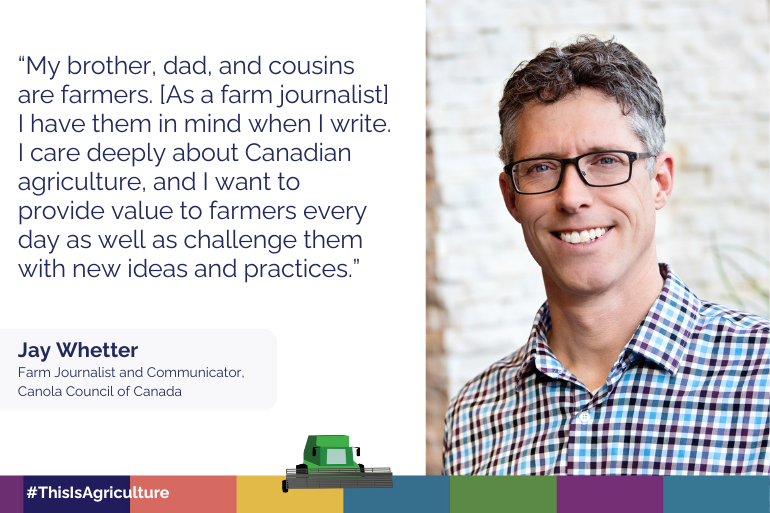
Jay Whetter grew up in a family of farmers near Dand, Manitoba. While much of his family still farms today, Jay’s career took him down a different path in agriculture. Today, he works as a Farm Journalist and Communicator at Canola Council of Canada and has over 25 years of journalism experience. While completing his journalism studies, becoming a farm journalist was not the end goal. However the jobs continued to find him until he realized that the industry needs communicators. Jay writes about prairie farming and agriculture solutions that highlight the advancements of technology in farm profitability, productivity, and sustainability. You can read his work in Canola Digest and The Narwhal.
Describe your job in one sentence.
I write to inspire farmers and agronomists to think about best practices, new ideas, and new research to improve farm profitability, Canadian productivity, and the environmental benefits of agriculture.
What was your first job in the agriculture or agri-food sector?
I grew up on a farm and worked there every summer. My first journalism job was with the Manitoba Co-operator as a summer student, but I still wasn’t convinced that’s what I wanted to do. In fact, I never applied for a job after that. They came to me. People needed farm journalists.
What first piqued your interest in agriculture and agri-food?
I did not intend to be a farm journalist when I went to journalism school. I wanted to work for CBC radio and tell stories about Canada and Canadians. When I was a kid driving the farm equipment and listening to AM radio, these stories were inspiring. But when Golden West Manitoba, a rural radio station, reached out to the college looking for a person with agriculture experience to start that Monday, I was the obvious choice – being from a farm. I was the one and only farm desk reporter for all of Golden West’s Manitoba stations. I had to do four or five interviews a day to fill about 20 minutes of air time. Seven months later I went to Country Guide.
What’s your favourite part about working in agriculture and agri-food?
Doing my part to make an essential industry even better. I want to dig into agricultural technologies and practices that will reduce pesticide use per acre, improve nitrogen use efficiency, and improve output per input. I look for solutions that will improve farm profitability, overall productivity, and the environment. I grew up in a tiny farming community, and my brother, dad, and cousins are farmers. I have them in mind when I write. I care deeply about Canadian agriculture, and I want to provide value to farmers every day as well as challenge them with new ideas and practices.
Journalists can get a bad rap, but we spend the time digging into issues or practices that not everyone has time to do. Farmers can get information from people trying to sell them something, from social media, from coffee shops, from field tours and events, but this takes effort. Newspapers and magazines, whether online or in print, are easy to access and provide a package of updates on government policy, agronomy practices, new technology, research, and so much more.
Why do you think digital agriculture is important, now more than ever?
Digital agriculture uses sensors, computers, and data to improve profitability, productivity, and environmental benefits of agriculture. It will continue to evolve and become a bigger part of farming. With the help of digital agriculture, tools will become “plug and play” so the learning curve to adopt them will be lower.
What’s something that surprised you when you started working in agriculture?
The incredible diversity of opportunities within the sector. Anyone can find a fulfilling job in agriculture. If I knew of this potential when I was in Grade 12, I probably would have taken an agriculture degree at the University of Manitoba. The world is your oyster with an agriculture degree.
This profile is part of EMILI’s This is Agriculture series, highlighting talented and diverse individuals across the digital agriculture sector. While individuals working in agriculture come from a variety of backgrounds, they share a common interest in growing and strengthening Canadian agriculture to ensure an environmentally and economically sustainable future for generations to come.
